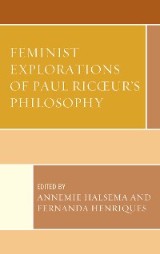Details

Feminist Explorations of Paul Ricoeur's Philosophy
Studies in the Thought of Paul Ricoeur
|
104,99 € |
|
| Verlag: | Lexington Books |
| Format: | EPUB |
| Veröffentl.: | 19.05.2016 |
| ISBN/EAN: | 9781498513692 |
| Sprache: | englisch |
| Anzahl Seiten: | 284 |
DRM-geschütztes eBook, Sie benötigen z.B. Adobe Digital Editions und eine Adobe ID zum Lesen.
Beschreibungen
<span><span>This book for the first time brings together considerations upon the feminine in relation to Paul Ricœur’s thinking. The collection of renowned scholars who have published extensively on Ricoeur and promising younger scholars together shows the rich potential of his thought for feminist theory, without failing to critically scrutinize it and to show its limitations with respect to thinking gender differences. <br>In the first part, “Ricœur, Women, and Gender,” Ricœur’s work is taken as the starting point for the reflection upon the position of women and the feminine, and for rethinking the notion of universalism. In the second part, “Ricœur in Dialogue,”his work is related to feminist thinkers such as Simone de Beauvoir, Judith Butler, and Nancy Fraser and to the work of artist Kara Walker. These dialogues aim at thinking through socially relevant notions such as discourse, recognition, and justice. In the third part, “Ricœur and Feminist Theology,” Ricœurian notions and ideas are the starting point for new perspectives upon feminist theology. <br>The insights developed in this book will be of particular value to students and scholars of Ricœur, feminist theory, and the limits of hermeneutics and phenomenology.</span></span>
<span><span>This is the first volume to consider the relevance of hermeneutical philosopher Paul Ricoeur’s thinking for feminist theory. Fourteen renowned scholars, including some young promising ones, critically investigate the gendered aspects of Ricoeur’s main conceptions and </span><span>explore new possibilities and opportunities for feminist thinking with the help of his philosophy. Among the themes addressed are </span><span>justice, recognition, critique, discourse, imagination, the capable subject, and universalism.</span></span>
<span><span>Introduction</span></span>
<br>
<span><span>Annemie Halsema and Fernanda Henriques</span></span>
<br>
<span><span> </span></span>
<br>
<span><span>Part I: Ricœur, Women and Gender</span></span>
<br>
<span><span> </span></span>
<br>
<span><span>Chapter 1. </span><span> Ricœur, Women, and the Journey to Recognition</span></span>
<br>
<span><span>Morny Joy</span></span>
<br>
<span><span> </span></span>
<br>
<span><span>Chapter 2. </span><span>Speak to Silence and Identify Absence on Campus: Sister Prudence and Paul Ricœur on the Negated Woman Question</span></span>
<br>
<span><span>Alison Scott-Baumann</span></span>
<br>
<span><span> </span></span>
<br>
<span><span>Chapter 3. </span><span>The Metaphor of Gender: Recognition and Dignity</span></span>
<br>
<span><span>Carlos</span><span> A. Garduño Comparán</span></span>
<br>
<span><span> </span></span>
<br>
<span><span>Chapter 4. Transnational Feminist Solidarities and Cosmopolitanism: in Search of a New Concept of the Universal</span></span>
<br>
<span><span>Damien Tissot</span></span>
<br>
<span><span> </span></span>
<br>
<span><span>Part II: Ricœur in Dialogue </span></span>
<br>
<span><span> </span></span>
<br>
<span><span>Chapter 5. “The Accountable </span><span>Ipse.</span><span>” The Ethical Self in Ricœur’s Hermeneutics and Butler’s Poststructuralism</span></span>
<br>
<span><span>Annemie Halsema</span></span>
<br>
<span></span>
<br>
<span><span>Chapter 6. Paul Ricœur and Judith Butler on the Reference and the Renewal of Discourses</span></span>
<br>
<span><span>Marjolaine Deschênes</span></span>
<br>
<span></span>
<br>
<span><span>Chapter 7. Reshaping Justice: Between Nancy Fraser’s Feminist Philosophy and Paul Ricœur’s Philosophical Anthropology</span></span>
<br>
<span><span>Gonçalo Marcelo</span></span>
<br>
<span></span>
<br>
<span><span>Chapter 8. Inspiring New Feminist Perspectives: Reading Paul Ricœur with Simone de Beauvoir</span></span>
<br>
<span><span>Annlaug Bjørsnøs</span></span>
<br>
<span><span> </span></span>
<br>
<span><span>Chapter 9. Hermeneutics of</span><span> A Subtlety</span><span>: Paul Ricœur, Kara Walker, and Intersectional Hermeneutics</span></span>
<br>
<span><span>Scott Davidson and Maria del Guadalupe Davidson</span></span>
<br>
<span><span> </span></span>
<br>
<span><span>Part 3: Ricœur and Feminist Theology</span></span>
<br>
<span><span> </span></span>
<br>
<span><span>Chapter 10. Ricœur in Dialogue with Feminist Philosophy of Religion. Hermeneutic Hospitality in Contemporary Practice </span></span>
<br>
<span><span>Pamela Sue Anderson</span></span>
<br>
<span><span> </span></span>
<br>
<span><span>Chapter 11. Paul Ricœur, Mary Daly, Attestation and the Dis-covery of Feminine Religious Symbols</span></span>
<br>
<span><span>Stephanie N. Arel </span></span>
<br>
<span><span> </span></span>
<br>
<span><span>Chapter 12. The Contribution of Ricœur’s Hermeneutics to a Feminist Perspective on Postcolonial Theology</span></span>
<br>
<span><span>Fernanda Henriques and Teresa Martinho Toldy</span></span>
<br>
<span><span> </span></span>
<br>
<span><span>List of Contributors</span></span>
<br>
<span></span>
<br>
<span><span>Annemie Halsema and Fernanda Henriques</span></span>
<br>
<span><span> </span></span>
<br>
<span><span>Part I: Ricœur, Women and Gender</span></span>
<br>
<span><span> </span></span>
<br>
<span><span>Chapter 1. </span><span> Ricœur, Women, and the Journey to Recognition</span></span>
<br>
<span><span>Morny Joy</span></span>
<br>
<span><span> </span></span>
<br>
<span><span>Chapter 2. </span><span>Speak to Silence and Identify Absence on Campus: Sister Prudence and Paul Ricœur on the Negated Woman Question</span></span>
<br>
<span><span>Alison Scott-Baumann</span></span>
<br>
<span><span> </span></span>
<br>
<span><span>Chapter 3. </span><span>The Metaphor of Gender: Recognition and Dignity</span></span>
<br>
<span><span>Carlos</span><span> A. Garduño Comparán</span></span>
<br>
<span><span> </span></span>
<br>
<span><span>Chapter 4. Transnational Feminist Solidarities and Cosmopolitanism: in Search of a New Concept of the Universal</span></span>
<br>
<span><span>Damien Tissot</span></span>
<br>
<span><span> </span></span>
<br>
<span><span>Part II: Ricœur in Dialogue </span></span>
<br>
<span><span> </span></span>
<br>
<span><span>Chapter 5. “The Accountable </span><span>Ipse.</span><span>” The Ethical Self in Ricœur’s Hermeneutics and Butler’s Poststructuralism</span></span>
<br>
<span><span>Annemie Halsema</span></span>
<br>
<span></span>
<br>
<span><span>Chapter 6. Paul Ricœur and Judith Butler on the Reference and the Renewal of Discourses</span></span>
<br>
<span><span>Marjolaine Deschênes</span></span>
<br>
<span></span>
<br>
<span><span>Chapter 7. Reshaping Justice: Between Nancy Fraser’s Feminist Philosophy and Paul Ricœur’s Philosophical Anthropology</span></span>
<br>
<span><span>Gonçalo Marcelo</span></span>
<br>
<span></span>
<br>
<span><span>Chapter 8. Inspiring New Feminist Perspectives: Reading Paul Ricœur with Simone de Beauvoir</span></span>
<br>
<span><span>Annlaug Bjørsnøs</span></span>
<br>
<span><span> </span></span>
<br>
<span><span>Chapter 9. Hermeneutics of</span><span> A Subtlety</span><span>: Paul Ricœur, Kara Walker, and Intersectional Hermeneutics</span></span>
<br>
<span><span>Scott Davidson and Maria del Guadalupe Davidson</span></span>
<br>
<span><span> </span></span>
<br>
<span><span>Part 3: Ricœur and Feminist Theology</span></span>
<br>
<span><span> </span></span>
<br>
<span><span>Chapter 10. Ricœur in Dialogue with Feminist Philosophy of Religion. Hermeneutic Hospitality in Contemporary Practice </span></span>
<br>
<span><span>Pamela Sue Anderson</span></span>
<br>
<span><span> </span></span>
<br>
<span><span>Chapter 11. Paul Ricœur, Mary Daly, Attestation and the Dis-covery of Feminine Religious Symbols</span></span>
<br>
<span><span>Stephanie N. Arel </span></span>
<br>
<span><span> </span></span>
<br>
<span><span>Chapter 12. The Contribution of Ricœur’s Hermeneutics to a Feminist Perspective on Postcolonial Theology</span></span>
<br>
<span><span>Fernanda Henriques and Teresa Martinho Toldy</span></span>
<br>
<span><span> </span></span>
<br>
<span><span>List of Contributors</span></span>
<br>
<span></span>
<span><span>Annemie Halsema </span><span>is assistant professor in the Department of Philosophy of VU-University Amsterdam and board member of the International Association of Women Philosophers (IAPh).<br><br></span><span>Fernanda Henriques </span><span>is professor in the Department of Philosophy of University of Évora.</span></span>


















